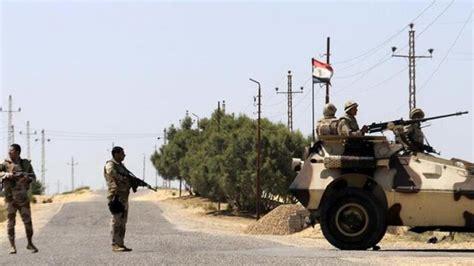
Egypt: Sisi government ‘granted amnesty’ to Islamic State fighters who committed war crimes in Sinai
Egypt’s authorities have made “questionable” amnesty deals with suspected members of an Islamic State affiliate in North Sinai without plans to prosecute them for serious crimes against civilians, two rights groups said on Wednesday.
According to evidence gathered by the Sinai Foundation for Human Rights and Human Rights Watch (HRW), including public statements by officials in President Abdel Fattah el-Sisi’s government, authorities have granted members of Wilayat Sina’ (Sinai Province) amnesty in exchange for laying down their arms and surrendering to the army.
“Amnesties for members of armed groups who lay down their arms should never include those who intentionally carried out grave crimes such as targeting or deliberately killing civilians,” said Ahmed Salem, executive director of the Sinai Foundation for Human Rights (SFHR).
“Egyptian authorities should develop a national strategy for Wilayat Sina’ prosecutions, ensuring that those with direct responsibility for serious crimes do not enjoy impunity,” said Salem.
The Egyptian army, aided by local tribesmen, fought a war against members of the Sinai Province between 2013 and 2022.
The group, which was relatively small and poorly armed, has been defeated, according to the Egyptian army and local Sinai tribal sources who spoke to Middle East Eye.
During the course of the war, thousands of indigenous inhabitants of North Sinai villages were forcibly displaced and have yet to return to their lands, much of which has been turned into a buffer zone along the borders with Israel and Gaza.
During the nearly 10 years of hostilities, HRW and SFHR have documented war crimes committed by both sides of the conflict. HRW has accused the Egyptian army of committing “possible war crimes”. Cairo has yet to investigate the alleged violations or bring anyone to justice.
The Sinai Province has also been accused of war crimes, including torture and extrajudicial executions.
In one incident, the group claimed responsibility for an attack on a local mosque in 2017 that killed more than 300 worshippers. The Egyptian government estimates at least 650 civilians have been killed by the Sinai Province since 2013.
The two rights groups have previously accused authorities of unlawfully detaining and abusing female and junior relatives of Islamic State suspects to pressure the suspects to turn themselves in.
The laws of armed conflicts allow the granting of the broadest possible amnesties at the end of hostilities, but that does not include individuals suspected of or charged with committing grave violations of international humanitarian law.
“The authorities should make public the criteria used to grant amnesty and measures taken to ensure that those responsible for serious abuses face justice,” the two organisations said.
President Sisi came to power in 2014 after a coup he led against his democratically elected predecessor, Mohamed Morsi, a year earlier. His presidential term was renewed twice, in 2018 and late last year, after elections marred by a ferocious crackdown on his opponents. He has repeatedly promised an end to militant insurgency in Sinai.
The amnesty given to IS members stands in stark contrast to Sisi’s policy of detaining tens of thousands of peaceful critics since 2013, said Bahey eldin Hassan, director of the Cairo Institute for Human Rights Studies.
“While the Egyptian government arbitrarily imprisons tens of thousands of peaceful prisoners of conscience for about 10 years in violation of the law and the constitution, and treats them and their families in the most horrific treatment, it pardons members of ISIS, who may be accused of mass murder of civilians and soldiers,” he wrote on X.
Egyptian jails hold at least 65,000 political prisoners opposed to Sisi, according to a study released by the Arabic Network for Human Rights Information in April 2021.
Source » middleeasteye.net





